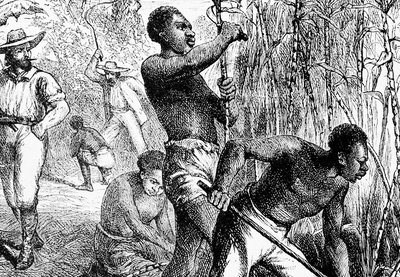Throughout the centuries there has been a fight against slavery. There were always people for it and against it. Most people would try to use their religion to justify their actions on whether or not they should condone or condemn slavery. They would use religious excerpts from religious books like the Bible to try and condone slavery but then others would pull other excerpts and letters written by religious leaders to condemn slavery.
For the longest time people would try to say that slavery was justified in the Bible because of different epistles including; Ephesians 6:5, Colossians 3:22, and 1 Peter 2:18. Even though when looking at these epistles at a glance on paper and seeing them as if they support slavery, when taking them into consideration and breaking down the meaning of these epistles we see that they are against the slavery that we have come to know today
Many people will take verses out of the Bible and just use them to justify their actions but you have to look at the Bible as a whole because it is a progressive revelation. This is important because it goes to show that even though some parts of the Bible may say somethings we must remember to use the Bible as a whole to get an actual interpretation.
Also, many people believe that the Catholic Church has only recently condemned slavery but in fact the Church had made many claims and letters condemning slavery dating back to 1435. One of these letters includes a letter from Pope Eugene IV in which he states, “Therefore We ... exhort, through the sprinkling of the Blood of Jesus Christ shed for their sins, one and all, temporal princes, lords, captains, armed men, barons, soldiers, nobles, communities and all others of every kind among the Christian faithful of whatever state, grade or condition, that they themselves desist from the aforementioned deeds, cause those subject to them to desist from them, and restrain them rigorously.” What the Pope is saying here is that the Catholic Church is against slavery and exhort that everyone desist from it entirely.
Also the Pope states that “These people are to be totally and perpetually free and are to be let go without the exaction or reception of any money”. This goes to show that not only did they condemn slavery but the insisted that all slaves shall be freed without any exception or compensation. An important part of this letter is the date that it was written. Although many believe the Catholic Church did not condemn slavery until the late 18 hundreds, they actually were against it way back in 1435. This goes to show that the Catholic Church was against slavery and the slave trade 60 years before Europeans would even discover the New World, where slavery became a prominent part of American history. So when people try to use verses form the Bible to justify slavery and try to say that the Catholic Church didn’t condemn slavery until the late eighteen hundreds we can see that this is not true, and in fact the Church was against slavery and the slave trade way before slavery became a prominent part of history.
A vast majority of religious believers today do not condone or support slavery. However, There was a time when certain religious texts such as the bible, were being written that slavery was normalized and a part of everyday life. There are multiple examples in the bible where slavery is both mentioned and condoned. Although this does not mean that the religions revolve around slavery; it does give people a good idea of what the feelings about slavery were during the times these religious books were scribed. For example in the Bible, Paul states “Slaves, be obedient to your human masters with fear and trembling, in sincerity of heart, as to Christ”. In this specific passage Paul is speaking to a runaway slave and convincing him to return to his master and obey him like he would Jesus. This quote shows paul, who in the bible is an apostle and a strong believer and teacher of Christianity not only condoning slavery, but also going out of his way to make sure it continues. Another very similar example of this is in Colossians 3:22-24. This passage says “Slaves, obey your earthly masters in everything; and do it, not only when their eye is on you and to curry their favor, but with sincerity of heart and reverence for the Lord”. This portion is essentially saying that if slaves do not follow whatever their masters say to do, then they are not living their lives for the lord. Lastly, there is one more example in Peter 2:18. In this passage Saint Peter writes “Slaves, be subject to your masters with all reverence, not only to those who are good and equitable but also those who are perverse”. This evidence states that basically if you are a slave and believe in Jesus Christ then you should obey your master even if they’re a terrible person. Times have changed drastically since the time the bible was written as slavery sadly was a very everyday kind of thing during biblical times. However, These passages and a few others throughout the bible seem to unintentionally condone slavery.


Comments
Post a Comment